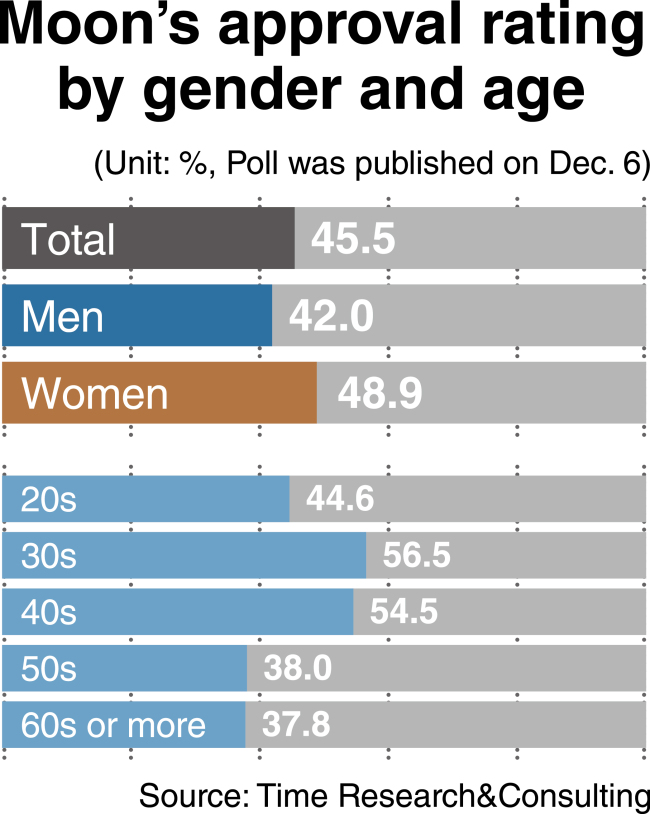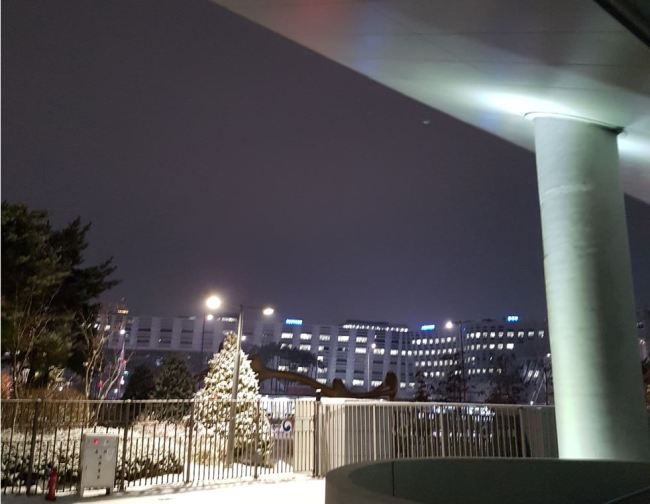[New Focus] Moon to enter midterm year amid economic, social polarization
By Kim Yon-sePublished : Dec. 13, 2018 - 18:08
SEJONG -- President Moon Jae-in has finished the first 19 months of his 60-month tenure and will enter his third administrative year in two weeks.
About 70 to 80 percent of South Koreans supported his administrative affairs last year. But Moon’s current approval rating has fallen to a record low, staying under 50 percent, according to polls conducted in recent weeks. Surveys by Realmeter, Gallup Korea and R&Search showed approval ratings of 49.5 percent, 49 percent and 47.9 percent, respectively, as of December.
About 70 to 80 percent of South Koreans supported his administrative affairs last year. But Moon’s current approval rating has fallen to a record low, staying under 50 percent, according to polls conducted in recent weeks. Surveys by Realmeter, Gallup Korea and R&Search showed approval ratings of 49.5 percent, 49 percent and 47.9 percent, respectively, as of December.

People in the online community generally share the view that the sharp drop in approval rating can be attributed to the Moon administration’s emphasis on North Korean issues since the 2018 PyeongChang Olympics.
Furthermore, a large portion of citizens interviewed by the media say that economic conditions of ordinary households have worsened over the past two years. Many of them are also calling for the president to scale down inter-Korean policies and pay more attention to the Korean economy.
“Our participation in the (2016) candlelit vigils was not for the sake of unification of the peninsula,” a netizen said. “Ballots for Moon at the time were asking him to re-establish social justice and improve living conditions of the middle and low-income brackets.”
Among supporters of the ruling Democratic Party of Korea, there appears to be many citizens who have conservative views on matters related to defense. Although they want peace, they do not seem to be supportive of Moon’s North Korea-leaning policies unless the Kim Jong-un regime dismantles its nuclear facilities.
During a visit to the Government Sejong Complex on Tuesday, Moon reprimanded the Ministry of Employment and Labor for failing to create high-quality jobs. However, his remarks have come under criticism, as the president blamed not the administration itself but civil servants.

The administration has pushed ahead an “income-led growth” policy by boosting the minimum wage.
However, the sharp hike in the minimum wage has brought about negative effects. For instance, a large number of small-sized manufacturers and retailers have been reluctant to hire job seekers due to the growing burden of labor costs. Some of them have also chosen to raise the prices of goods and food to offset their personnel costs.
“Ultimately, ordinary households are burdened with a drastic increase in consumer prices by 20 to 30 percent, a macro-economy analyst in Yeouido said. “Productivity and sales polarization is widening among businesses, and the majority of self-employed across the country say they are having the hardest time since the 2008 financial crisis.”
Meanwhile, Seoul apartment prices have continued to skyrocket since 2016, worsening the gap between the haves and the middle-income bracket.
Some cast doubt on Moon’s commitment to prioritizing justice and equal opportunities in society, as stated in his inaugural speech.
Political consultant Park Sung-min was quoted by a media outlet as saying that “conflicts are deepening between different generations and between different income-level segments.”
Park also cited data that showed an apparent disparity in support for Moon between male and female respondents. More seriously, online comments on news have been filled with gender disputes, compared with past political conflicts between provincial locations nationwide.
Amid the relatively unfavorable situation for the incumbent government, the president faces the crucial tasks of devoting all-out efforts to the domestic economy and placating supporters that feel alienated, experts point out.
For decades, the third year has determined the fate of past administrations.
A further slide in approval ratings down to the 30 percent level may advance the lame duck period of President Moon. Some political heavyweights, including Hong Joon-pyo, Park Jie-won and Sohn Hak-kyu, argue that Moon’s lame duck period has already begun.
In particular, Rep. Park Jie-won of the minor opposition Party for Democracy and Peace predicted a drop in Moon’s support rating among residents in the Chungcheong and Jeolla provinces in the coming months, amid growing negative sentiment toward Moon’s performance among those in the Gyeongsang provinces, male citizens in their 20s and the self-employed.
In contrast, political commentator Kim Hyung-joon refuted such views, saying it is currently premature to debate Moon’s lame duck period. He added that former Presidents Lee Myung-bak and Park Geun-hye saw their approval ratings bounce back after an initial phase of crisis.
By Kim Yon-se (kys@heraldcorp.com)


![[Exclusive] Korean military set to ban iPhones over 'security' concerns](http://res.heraldm.com/phpwas/restmb_idxmake.php?idx=644&simg=/content/image/2024/04/23/20240423050599_0.jpg&u=20240423183955)
![[AtoZ into Korean mind] Humor in Korea: Navigating the line between what's funny and not](http://res.heraldm.com/phpwas/restmb_idxmake.php?idx=644&simg=/content/image/2024/04/22/20240422050642_0.jpg&u=)




![[Graphic News] 77% of young Koreans still financially dependent](http://res.heraldm.com/phpwas/restmb_idxmake.php?idx=644&simg=/content/image/2024/04/22/20240422050762_0.gif&u=)
![[Herald Interview] Why Toss invited hackers to penetrate its system](http://res.heraldm.com/phpwas/restmb_idxmake.php?idx=644&simg=/content/image/2024/04/22/20240422050569_0.jpg&u=20240422150649)




![[Exclusive] Korean military to ban iPhones over security issues](http://res.heraldm.com/phpwas/restmb_idxmake.php?idx=652&simg=/content/image/2024/04/23/20240423050599_0.jpg&u=20240423183955)



![[Today’s K-pop] Ateez confirms US tour details](http://res.heraldm.com/phpwas/restmb_idxmake.php?idx=642&simg=/content/image/2024/04/23/20240423050700_0.jpg&u=)